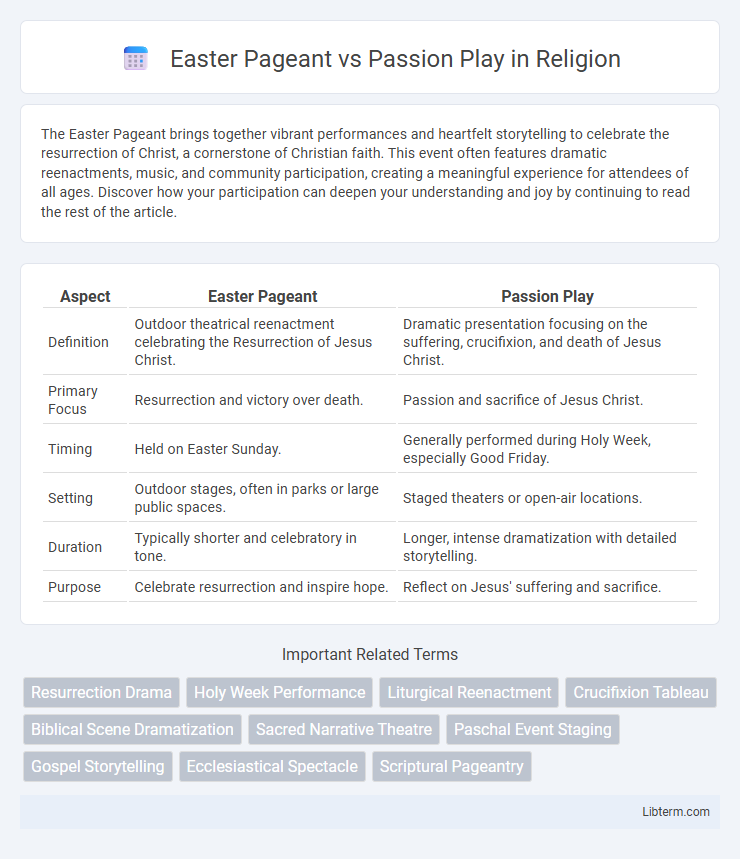The Easter Pageant brings together vibrant performances and heartfelt storytelling to celebrate the resurrection of Christ, a cornerstone of Christian faith. This event often features dramatic reenactments, music, and community participation, creating a meaningful experience for attendees of all ages. Discover how your participation can deepen your understanding and joy by continuing to read the rest of the article.
Table of Comparison
| Aspect | Easter Pageant | Passion Play |
|---|---|---|
| Definition | Outdoor theatrical reenactment celebrating the Resurrection of Jesus Christ. | Dramatic presentation focusing on the suffering, crucifixion, and death of Jesus Christ. |
| Primary Focus | Resurrection and victory over death. | Passion and sacrifice of Jesus Christ. |
| Timing | Held on Easter Sunday. | Generally performed during Holy Week, especially Good Friday. |
| Setting | Outdoor stages, often in parks or large public spaces. | Staged theaters or open-air locations. |
| Duration | Typically shorter and celebratory in tone. | Longer, intense dramatization with detailed storytelling. |
| Purpose | Celebrate resurrection and inspire hope. | Reflect on Jesus' suffering and sacrifice. |
Introduction to Easter Pageants and Passion Plays
Easter Pageants are large-scale outdoor theatrical productions depicting the resurrection of Jesus Christ, often involving elaborate costumes, live animals, and community participation. Passion Plays specifically dramatize the suffering, crucifixion, and death of Jesus, emphasizing the events leading up to Easter Sunday. Both traditions serve as powerful visual and emotional retellings of biblical narratives central to Christian faith.
Historical Origins of Easter Pageants
Easter Pageants trace their origins to the medieval period, where they were performed as part of the liturgical drama tradition in Europe, particularly within churches and cathedrals to depict biblical stories during Easter celebrations. These dramatized reenactments of Christ's resurrection were designed to educate and inspire predominantly illiterate congregations by visualizing key religious events. In contrast, Passion Plays center specifically on the Passion of Christ, focusing on the trial, crucifixion, and suffering, with roots extending back to early Christian rituals but formalized later in distinct theatrical traditions.
The Roots and Evolution of Passion Plays
Passion Plays originated in the Middle Ages as religious dramas depicting the suffering, crucifixion, and resurrection of Jesus Christ, rooted in liturgical ceremonies performed within churches. Easter Pageants evolved from these plays, expanding into large-scale outdoor performances that include broader Easter themes and community involvement, often integrating music, dance, and modern theatrical techniques. Both forms highlight the enduring cultural and spiritual significance of Christ's Passion, reflecting centuries of adaptation and regional variation in their portrayal of Easter narratives.
Key Differences Between Easter Pageants and Passion Plays
Easter Pageants typically emphasize the resurrection of Jesus Christ through vibrant, dramatized celebrations involving large casts and community participation, highlighting themes of hope and renewal during Easter Sunday. Passion Plays concentrate specifically on the suffering, crucifixion, and death of Jesus, often performed solemnly to depict the last hours before his resurrection, focusing on sacrifice and redemption. The key difference lies in the scope and tone: Easter Pageants are broader celebrations of Easter's joyous aftermath, while Passion Plays deliver a focused, intense portrayal of Christ's passion and sacrifice.
Theological Themes and Narratives
Easter Pageants emphasize the joyous resurrection of Jesus Christ, highlighting themes of redemption, renewal, and triumph over death to affirm Christian faith in eternal life. Passion Plays concentrate on the suffering and crucifixion of Jesus, portraying themes of sacrifice, atonement, and divine love to reflect on human sin and salvation. Both narratives complement each other by presenting a complete theological portrayal of the Easter story, from agony to glory.
Performance Styles and Production Elements
Easter Pageants typically emphasize communal participation and large-scale outdoor performances with vibrant sets, costumes, and music to celebrate the resurrection of Jesus. Passion Plays focus more on the dramatic retelling of Christ's suffering and crucifixion, often employing intense, theatrical acting styles and minimalistic production elements to highlight emotional depth. Both formats use historical reenactment, but Easter Pageants lean towards celebratory spectacle while Passion Plays prioritize solemn meditation through performance.
Cultural Significance Around the World
Easter Pageants, often celebrated with vibrant parades and elaborate costumes, emphasize the joyous resurrection of Christ, reflecting local customs and communal participation across countries like the Philippines and Brazil. Passion Plays, rooted in medieval Europe, dramatize the suffering and crucifixion of Jesus, serving as powerful expressions of faith and historical remembrance in regions such as Oberammergau, Germany, and the Holy Land. Both traditions showcase the diverse ways Christian communities worldwide commemorate Easter, blending religious devotion with cultural identity through performance arts.
Community Involvement and Audience Participation
Easter Pageants often emphasize large-scale community involvement, featuring numerous local volunteers who contribute to elaborate costumes, set designs, and musical performances. Passion Plays engage audiences by encouraging active participation through interactive storytelling and opportunities for congregational singing or prayer, fostering a communal spiritual experience. Both traditions strengthen community bonds by involving diverse groups in shared expressions of faith and cultural heritage.
Contemporary Adaptations and Trends
Contemporary adaptations of Easter Pageants often emphasize diverse community involvement and multimedia integration, enhancing audience engagement through dynamic storytelling and modern technology. Passion Plays increasingly incorporate historical accuracy and psychological depth, reflecting current social issues and fostering empathetic connections with Christ's suffering. Both forms experience trends toward interactivity and inclusive casting, appealing to broader, multicultural audiences in evolving religious landscapes.
Choosing Between an Easter Pageant and a Passion Play
Choosing between an Easter pageant and a passion play hinges on the desired storytelling focus and audience engagement; Easter pageants emphasize the joyous resurrection and celebrate Christ's victory over death with uplifting music and vibrant scenes. Passion plays center on the suffering, crucifixion, and sacrifice of Jesus, offering a profound reflection on redemption and grace through dramatic portrayal of biblical events. Consider the emotional tone, community involvement, and the intended impact when deciding which religious performance suits your Easter celebration best.
Easter Pageant Infographic

 libterm.com
libterm.com